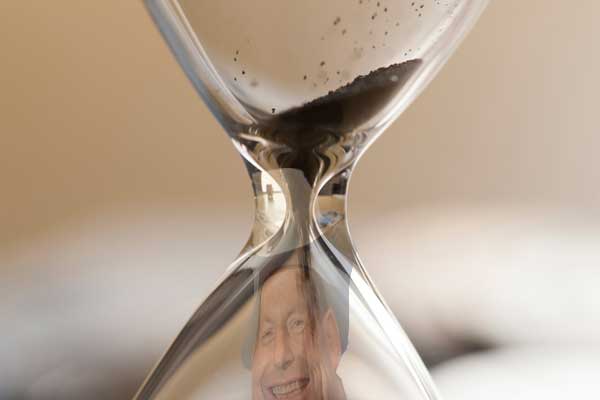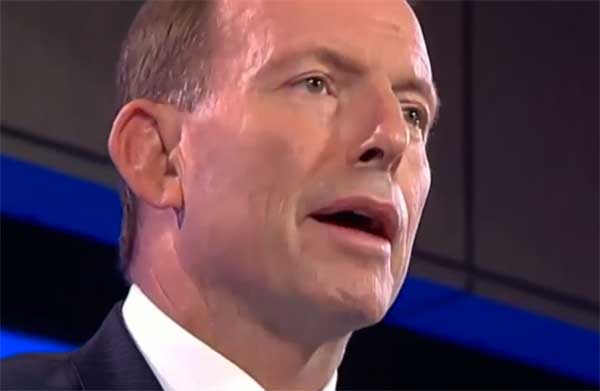Campbell Newman found out the hard way that money can’t actually buy everything.
In the lead-up to his political D-Day, Newman threw $18 million worth of promises at his Ashgrove electorate, pork-barrelling, generally speaking, being one of the most tried and tested methods of political survival.
The punters like prizes. Always have. But for Newman, it wasn’t enough to save his political skin. He was bundled out of office regardless of his largesse, due in no small part to the fact he was widely regarded as a bit of a thug, and more of a prick.
Tony Abbott has tried to buy a few things in the last few days as well. On Sunday, he announced that the contract to build Australia’s submarine fleet will go to an open tender, providing a glimmer of hope to South Australian MPs that the City of Churches might now get a look-in.
The leadership spill this morning was a secret ballot, so we don’t know precisely how Abbott’s internal pork-barrelling affected the vote. But whatever the outcome, Abbott survived a leadership spill by the skin on a chicken’s lips.
In the end there were 61 votes against, 39 in favour of the call to decide whether or not a new leadership vote should be held. While a leadership spill for a first-term sitting Prime Minister was always going to be a tall ask, those numbers are not good for Abbott. It was by no stretch of the imagination a convincing win.
At least four out of every 10 elected Liberals believe that Abbott should be replaced. That’s close to terminal.
What Abbott really bought himself was time, an important currency in politics, particularly when you’re facing a challenge to your leadership. But what matters with time is what you do with it, and the jury remains out on whether he can ever win the hearts and minds of a substantial majority of his colleagues, let alone the Australian people.
Abbott can recover, of course. But the polls are against him and, more importantly, so is modern history.

No Prime Minister since Bob Hawke almost three decades ago has survived a challenge to their leadership in the short or longer term. In Hawke’s case, he won the first round against Paul Keating, who retreated to the backbench and stalked. And stalked. And finally got his man. Keating used his time very well.
The removal of Rudd, of course, was more swift, more brutal. And of course, timing was key.
Like Abbott, Rudd’s leadership style was widely hated within the party. But unlike Abbott, Rudd did not have the advantage of a party room with recent lived experience of what leadership turmoil can do to a voting public. Gillard had the same problem, courtesy of her minority government win at the only election she ever contested.
Which explains the Liberals’ key message over the weekend in the lead-up to the spill: ‘We don’t want to be like Labor’.
It was a no brainer strategy, and would have resonated with more conservative members. Rudd, Gillard and the Labor wipeout at the 2013 election, despite facing off against a desperately unpopular Opposition leader, are the living, breathing examples of disunity meaning death in politics.
With one big caveat. Times have changed. Political convention has been turned on its head in recent years, with all sorts of political records broken.
In 2007, John Howard became the first sitting Prime Minister since 1928 to be voted out of parliament while in The Lodge. Had they removed him, well, who knows. But that’s a broken political record worth noting.
Kevin Rudd became the first Prime Minister to be removed in a spill before re-contesting an election. Another important record.
The rare federal event of ‘minority government’ came to Canberra in 2010, and it’s likely to be the case in Queensland now as well. Tasmania and the Northern Territory have both had minority governments in very recent years, and Victoria and South Australia have both only been a scandal and by-election away from it as well.
The greatest indicator of a changing political time is the recent routing of first term Liberal governments in Victoria and Queensland. It reveals not only a growing unrest – and a polarized division – in the Australian electorate, but the reality that the rules of politics in Australia have changed.
Disunity may mean death, but as Campbell Newman and the LNP found out, so does sticking with a leader who is reviled by the public.
The middle ground of voters – where the battles are actually won and lost – are growing tired of the incessant spin. They’re turning away from slogans, and they’re no fans of ‘austerity’. They don’t like mean and tricky leaders, and they hate liars.
One of their biggest bug-bears appears to be governments lead by zealots who divide, and are perceived as bullies. Campbell Newman is the case in point. Tony Abbott is as well.
So Abbott needs a new strategy, and the best one available to him is to use time to his advantage.
Over the coming months, he must secure a rise in the opinion polls. If he languishes, he’s gone. And if he does, then Abbott must call an early election. He doesn’t need to be in front in the polls, he just needs to be in a winnable position, knowing that the polls usually tighten as the election draws near.
It’s a huge gamble, but Abbott has nothing to lose. Except his leadership, which seems inevitable but as a best case scenario becomes more and more likely the longer he has no win to point out to his party.
Abbott’s best excuse for a snap election is the hostility in the Senate, which is still blocking significant parts of his budget from last year. Not a double dissolution, but a general election to end the impasse.
And so his next budget will be crucial. If it’s another dog, Abbott is done. If it's filled with lashing of pork – and it almost certainly will be every bit an 'election year' budget, regardless of when the election is actually held – he buys more time.
Given how much damage the last budget has done to the party brand and the leader’s fortunes, it seems almost inconceivable, that Abbott and Treasurer Joe Hockey will get it wrong again. But the horrors of their last effort are matched only by the depths of their ideology.

Abbott needs a definitive victory in government not for the people, but for his party. That’s what time bought him – a chance to prove to his colleagues that he can deliver.
His key problem is that having ‘stopped the boats’, immigration is now running dead. The War in Iraq will not be resolved anytime soon. And you can only weigh into so many international conflicts before you start to look like a war-monger, with something to hide at home. And Abbott looked like that months ago.
The escalating situation in Ukraine will be of interest to Abbott, but Europe is a long way away, and fear can only do so much for an unpopular leader viewed cynically by the middle ground of politics (who are less susceptible to fear-based politics).
Abbott’s only foreseeable hope is that he hands down a federal budget in May that silences his internal critics, and starts him moving up in the opinion polls.
In the meantime, one of the things that’s likely to emerge in the coming weeks and months is that Liberals and their allies in the Murdoch press will try and jump the gun. They’ll be suggesting that things – ie. Abbott – have improved, whether they have or they haven’t. It’s important to remember that in summating the Prime Minister’s performance, things could hardly have gotten any worse. Put simply, Abbott not making himself the subject of utter ridicule represents progress, such are the depths of his problems.
But from a party perspective, the spin will just be rhetoric – the stuff you have to say to support the leader. The Liberals, so determined to avoid an ugly leadership spill, may appear to rally behind mediocrity, but if the opinion polls don’t shift, Abbott’s days will be increasingly numbered.
He does have time, but his stalkers do as well – we’re two years away from an election, more than enough time to wait and watch, and install a new leader if things don’t improve, particularly a leader like Malcolm Turnbull, who doesn’t have to build a profile.
And that’s another reason why Abbott will be eyeing off an early election – it will give his plotters less time to put a new face in with a reasonable run-up to voting day.
For Abbott’s part, and that of his senior leadership team, the other key message over the coming weeks and months will be that the matter is now resolved. Of course, the tension inside the party has not been.
Abbott is one major slip-up away from ending his political career, and if past behavior is the best predictor of future behavior, then politically speaking the clock is ticking.
Donate To New Matilda
New Matilda is a small, independent media outlet. We survive through reader contributions, and never losing a lawsuit. If you got something from this article, giving something back helps us to continue speaking truth to power. Every little bit counts.



